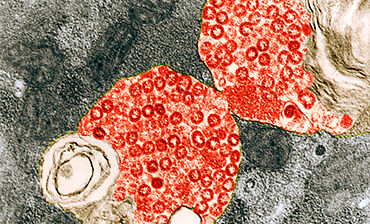Severe acute respiratory syndrome (SARS)

Severe acute respiratory syndrome (SARS) is a life-threatening respiratory disease caused by a coronavirus; the SARS-associated coronavirus (SARS-CoV). This is believed to be an animal virus that recently crossed the species barrier to infect humans.
The first cases of disease in humans are believed to have occurred in Guangdong province, China, in November 2002, but the syndrome was only recognised three months later. Following its emergence, transmission of the virus occurred person to person, mostly via droplets (inhalation).
The incubation period ranges between 3 and 10 days. A high fever then appears accompanied by general symptoms and, often, by diarrhoea. Some days later, pneumonia becomes manifest, which in some cases progresses to produce fatal respiratory failure (overall death rate has been about 10%, but exceeded 50% for patients aged over 60 years).
The natural reservoirs of SARS-CoV have not been identified, but a number of species of wildlife (e.g. civets, ferrets) consumed as delicacies in southern China have been found to be infected by a related coronavirus. Domestic cats living in the Amoy Gardens apartment block in Hong Kong (which was heavily hit by the outbreak) were also found to be infected. More recently, bats, ferrets and domestic cats were experimentally infected with SARS-CoV and found to efficiently transmit it. These findings indicate that the reservoir for this pathogen may include a wide range of animal species.



